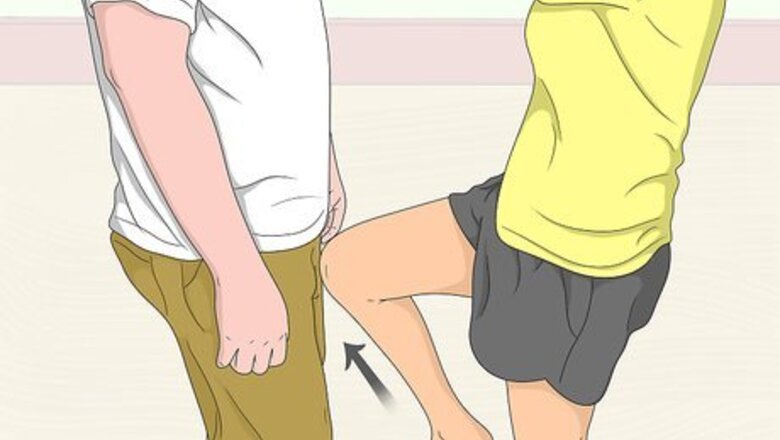
views
Attacking Vulnerable Areas
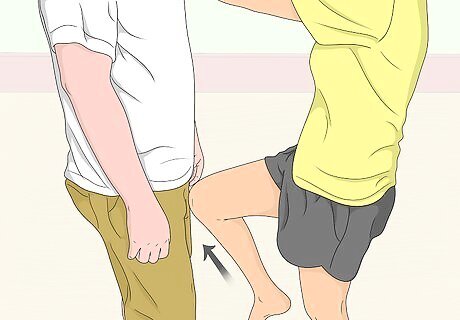
Kick your opponent in the groin to cause them a lot of pain. Use the leg that’s furthest from your opponent if you want the most power or the leg closest if you want the most speed. Try to hit their groin with the top of your foot or your shin so it hurts them the most. Most times, your opponent will drop to the ground or hunch over if they aren’t expecting the blow. It may take multiple hits to the groin to incapacitate your opponent. This works most effectively on male attackers, but it can still cause a lot of pain for females as well.Tip: Don’t look at your opponent’s groin before the attack since they could notice and prepare for the strike.
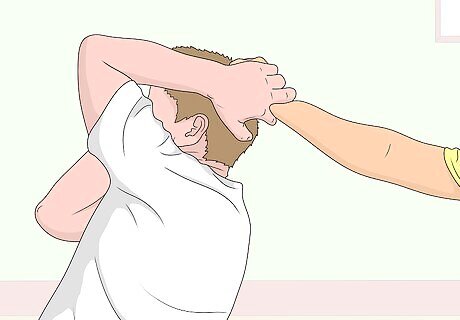
Pull on your opponent’s ears or hair to control their movements. If you’re within arm’s reach of your opponent, reach around the side or back of their head. Grab their ear or a fistful of their hair and pull in the direction you want your opponent to move. If your opponent tries to fight back, yank on their ear or hair harder so to make them feel more pain. You can try pulling ears or hair with both of your hands, but this could leave you vulnerable to an attack. Try to make your opponent hunch over so you can knee them in the face or drive your elbow into their back.
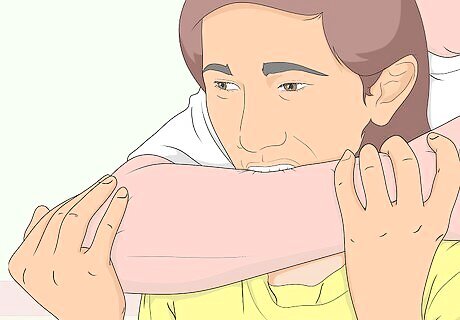
Bite your opponent if they’re holding onto you. If you aren’t able to move your arms or legs to fight back, open your mouth and bite down on the part of the body that’s closest to you. Try to find an area that has open skin or thin clothing so it hurts your opponent the most. Clench your jaw tightly and don’t let go until your opponent lets you go. If you break skin and get your opponent’s blood in your mouth, visit a doctor as soon as possible to make sure you don’t get any infections or diseases.
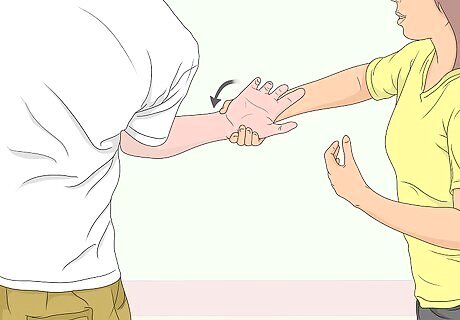
Grab and bend your opponent’s wrist or fingers to restrict them from moving. If your opponent reaches for you, do your best to wrap your hands around their palm or wrist. Squeeze as hard as you can and bend the joint backward so it hurts your opponent. Most times, your opponent will move in the direction you’re bending the joint so it doesn’t break any bones. Try to force your opponent away from you and toward the ground with your grab. You can also try locking their elbows or knees to control them more. If you’re in a life-or-death situation, bend the joint back as far as you can to break it. That way, you can have an opportunity to escape while your opponent is in pain.
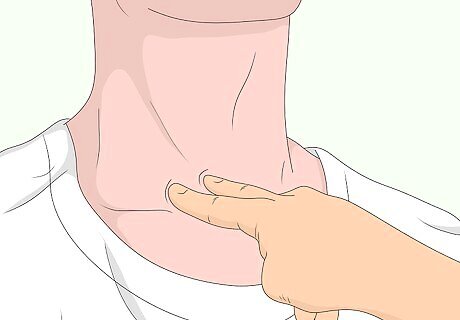
Jab your opponent’s throat with your fingers to stun them momentarily. Straighten your fingers and lock your wrist so you get the most power from your jab. Try to aim for the center of their throat or directly underneath their chin, and force your arm straight forward. If you land your jab, your opponent will have difficulty breathing momentarily so you can land another blow or get away. This works best if you’re standing an arm’s length away from your opponent. Be careful not to let your fingers or wrist go limp, or else your jab won’t be as effective. If you’re in a life-or-death situation, try using a closed fist to punch your opponent’s throat to collapse their windpipe.
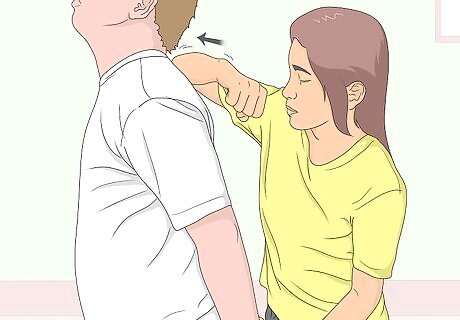
Strike the back of your opponent’s neck with your elbow if they’re hunched over. A blow to the back of the neck may cause your opponent to black out momentarily so you’re able to get away from them. When you get the opportunity, bend your elbow so it forms a sharp point and bring it down forcefully where their head and neck meet. If they don’t go down after the first hit, try hitting them repeatedly to force them to the ground. Try kicking your opponent in the groin first to force them down and make it easier to hit the back of their neck. If you can’t behind your opponent, then you can also try driving your elbow into their throat to make it difficult for them to breathe.
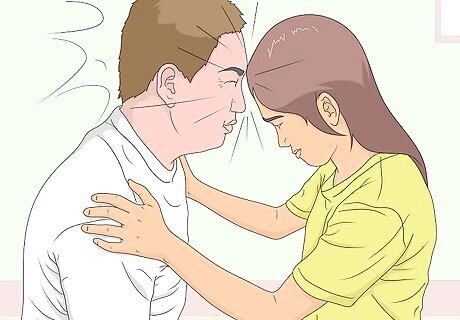
Headbutt your opponent to disorient them. If you’re within close range of your opponent, grab the sides of their head to control where they’re moving. Tilt your neck back and quickly slam your head into your opponent’s nose or the space between their eyes. Try to hit them with the top of your forehead since it’s the strongest part of your skull and it will hurt you the least. If you hit your opponent hard enough, you may knock them unconscious. Avoid hitting the top of their head since you’ll hurt yourself more.
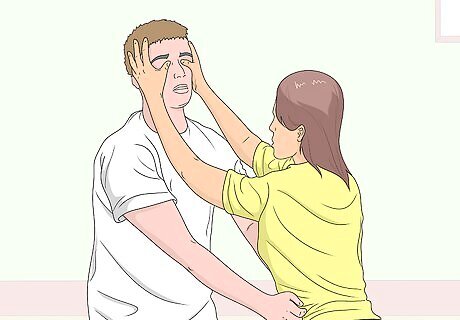
Push your thumbs into your opponent’s eyes if you’re in close range. Put your palms on the sides of your opponent’s face so your thumbs cover their eyes. Force your thumbs into their eye sockets to temporarily blind them and cause a lot of pain. Most times, your opponent will stop attacking so they can try to stop you. Push your opponent away from you so you can make a quick getaway while they recover. If you apply too much force to your opponent’s eyes, you may puncture their eyeballs and permanently blind them.
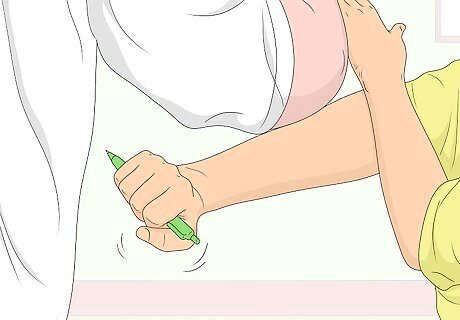
Use a weapon if you have one available. Look around you to see if there’s anything around you that you can use to defend yourself. For example, you could use a knife, pen, glass bottle, or keys to hit or stab your opponent. Swing your weapon near your attacker to keep them at a safe distance. If you need to hit them, aim for vulnerable areas, like their face, stomach, or hands to incapacitate them faster. If someone threatens you with a weapon, try to stay back at least 2 arm lengths away so you aren’t in danger. Using a weapon can seriously injure or kill someone, so only use one as a last resort. Sammy Franco Sammy Franco, Self-Defense Expert In a street fight, you cannot expect rules or fairness. You must be prepared to use decisive force and any effective technique from martial arts or boxing to neutralize the threat. While training in controlled environments is important, adapting your skills to the brutality of the street is the key to surviving a violent encounter.
Blocking Your Opponent’s Blows
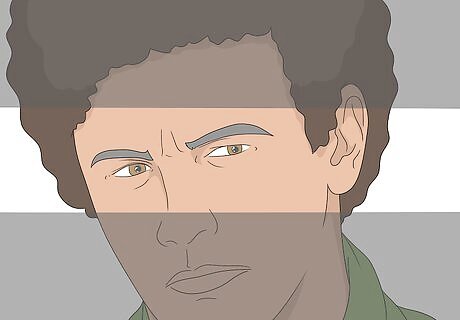
Snap to attention as soon as you expect a fight. If you notice a threat nearby, try to prepare yourself as soon as possible so you aren’t caught off guard by an attack. Get into an active position with your knees slightly bent so you’re able to fight back or react to your attacker’s movements. Make note of the objects in your surrounding area to see if there’s something you can use to defend yourself if needed. EXPERT TIP Dany Zelig Dany Zelig Self Defense Trainer Dany Zelig is the Founder and Owner of Tactica and the Tactica Krav Maga Institute headquartered in San Francisco, California. He is a 2nd generation Israeli Krav Maga instructor of Imi Lichtenfeld, certified directly by Imi’s most senior disciple and Head of the Rank Committee. He received his Military Krav Maga Instructor certification from the Wingate Institute in Israel in 1987. Dany Zelig Dany Zelig Self Defense Trainer Identify a dangerous situation as early as you can. The goal is to predict and prevent fights. If you are predicting a conflict, leave the area for safety. If you can't go, try to de-escalate the situation. If that doesn't work, physically defend yourself so that you can move to safety.
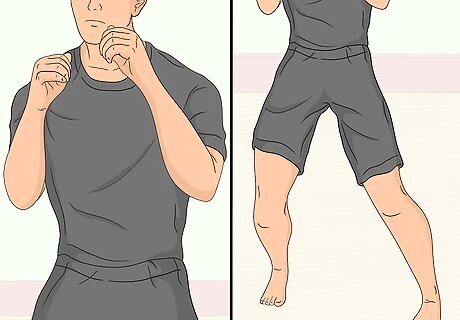
Stand with your body turned to the side so you’re harder to hit. Keep your non-dominant side pointed toward your opponent so your shoulder faces them. Keep your chest and hips facing to the side so your attacker has a more difficult time hitting you. Put your weight on the balls of your feet so you can easily move around or dodge your opponent’s attacks if you need to. Don’t keep your body square to your opponent, or else your chest and stomach will be an easier target. Keep your knees bent and your body slightly crouched so you become a smaller target. Be careful so your opponent doesn’t kick or knee you in the head.
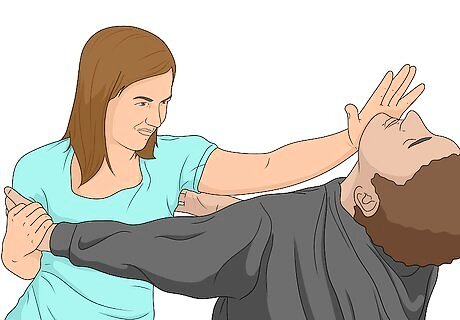
Watch your opponent’s movements so you can predict their attacks. Pay attention to the direction your opponent’s looking and where they move their arms so you can predict their attacks. Avoid looking away from the fight or getting distracted so you don’t get hit unexpectedly. If you do need to look somewhere else, glance away quickly before returning your attention back to your attacker. Make sure you’re aware of your surroundings as well so you don’t get backed into a corner or trip on something.
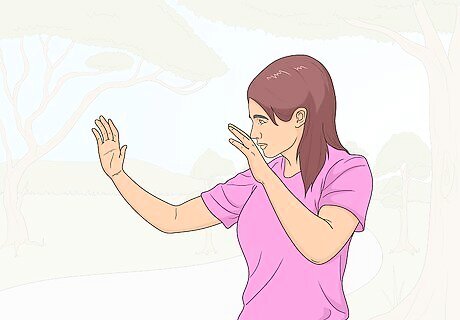
Keep your hands in front of you to help you block your opponent’s blows. If you expect your opponent to punch you, hold your forearms straight up in front of your face so you can easily move them to block the hit. You may also try holding your arms out in front of you with your elbows slightly bent so you can reach further and respond to attacks quicker. Keep your palms open rather than making fists so you can easily push your opponent’s arms away. When your opponent attacks, tuck your head down to hide more vulnerable spots like your nose and eyes.
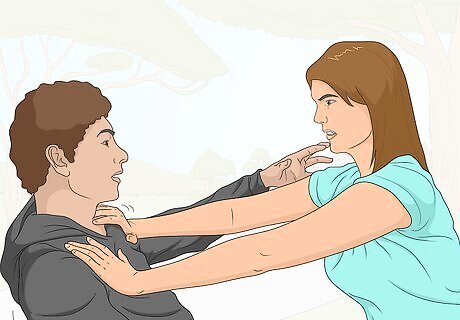
Push your opponent away to get some space between you. After you land a hit or when your opponent is between attacks, push on their chest as hard as you can to move them away. That way, you have time to get back into a fighting stance and prepare for their next attack. If you push hard enough, you may knock your opponent off balance and make them fall so you can get away. Try to land another hit while your opponent is off guard so they don’t have time to recover.
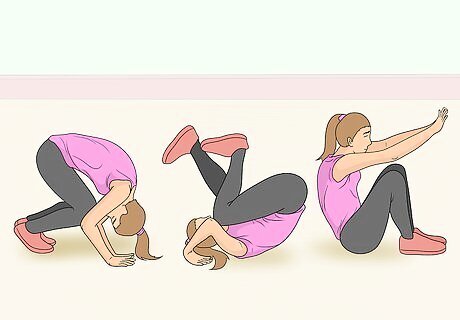
Roll out of a fall so you don’t get pinned on the ground. Avoid falling flat on your back or stiffening up if you’re brought to the ground since it will slow you down. Instead, loosen your body and try to somersault so you can get back on your feet faster. Tuck your head as you fall so you don’t hurt yourself while you’re rolling on the ground. If you do fall flat on the ground, try to roll away and get back on your feet as soon as possible.
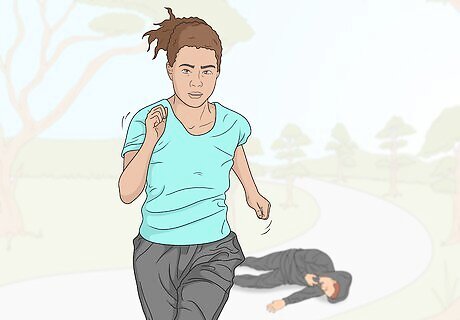
Run away from the fight as soon as you’re able. Don’t stay in the fight longer than you need to since you could put yourself in more danger. If you knock your opponent down or they’re stunned, get away and get as far away from your attacker as you can. As you run away, call for help if you need it or if you still feel like you’re in danger.












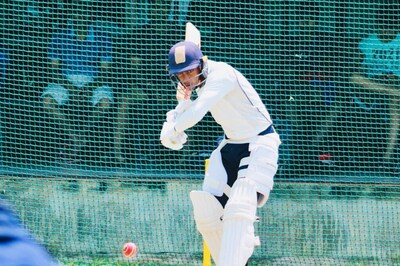





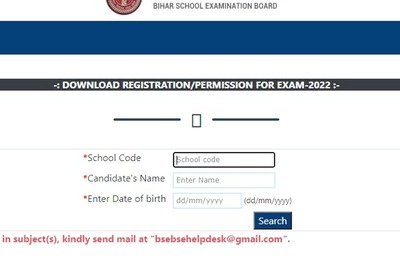

Comments
0 comment